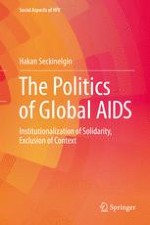2017 | OriginalPaper | Buchkapitel
5. Global AIDS and the Politics of Knowledge
verfasst von : Hakan Seckinelgin
Erschienen in: The Politics of Global AIDS
Aktivieren Sie unsere intelligente Suche, um passende Fachinhalte oder Patente zu finden.
Wählen Sie Textabschnitte aus um mit Künstlicher Intelligenz passenden Patente zu finden. powered by
Markieren Sie Textabschnitte, um KI-gestützt weitere passende Inhalte zu finden. powered by
